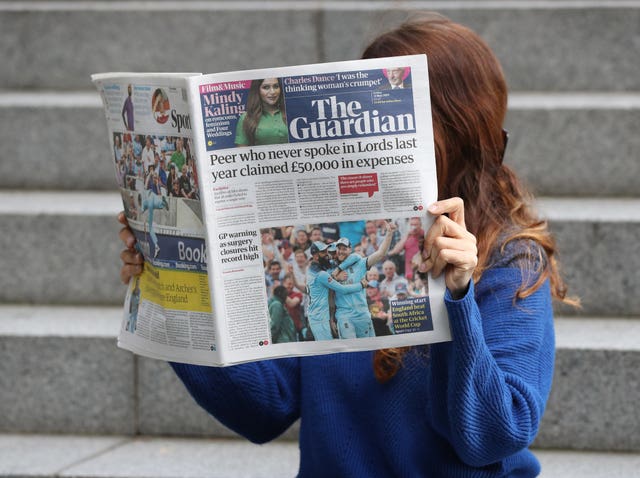The Guardian Media Group is in talks to sell The Observer newspaper to Tortoise Media, a news business launched in 2019 by a former BBC executive.
The media giant is in exclusive discussions to sell the world’s oldest Sunday newspaper.
Tortoise approached the Guardian newspaper group with an offer to buy the publication and invest more than £25 million over the next five years in the editorial and commercial side of the business.
It also plans on building the digital Observer and combining with Tortoise’s podcasts, newsletters and live events, while continuing to publish the Sunday newspaper.
The companies did not disclose the price or the terms of the potential deal.
The Observer was founded in 1791 and bought by Guardian Media Group (GMG) in 1993, where it is run as a separate paper to The Guardian.
Tortoise was co-founded by James Harding, a former director of news and current affairs at BBC News and editor of The Times.
The company, which specialises in what it describes as “slow news”, has produced investigations including the popular podcast series Sweet Bobby, which is set to be made into a Netflix documentary.
Mr Harding said: “We think The Observer is one of the greatest names in news.
“We believe passionately in its future – both in print and digital.
“We will honour the values and standards set under The Guardian’s great stewardship and uphold The Observer’s uncompromising commitment to editorial independence, evidence-based reporting and journalistic integrity.”
Anna Bateson, the chief executive of GMG, said it was an “exciting strategic opportunity” for the business” with “significant investment” into its future.
Katharine Viner, editor-in-chief of The Guardian, said a deal with Tortoise “has the potential to be a very positive thing”.
“My number one priority is a future in which both titles continue to thrive and deliver high quality journalism to our readers,” she said.
“It is extremely important to me that The Observer, with its excellent journalistic reputation, loyal readership and heritage as the world’s oldest Sunday newspaper, is in good hands.”
Meanwhile, GMG said it generated more revenues from digital readers over the past year, as it published the group’s latest financial results.
Digital reader revenue grew by 8% to £88.2 million in the year to the end of March, compared with the prior year, with more than a million recurring digital supporters.

The Guardian offers a digital subscription for £12 a month with unlimited access to its app, no adverts and a weekly newsletter.
It also uses pop-up banners to ask readers for money to support the publication’s independent journalism.
Overall revenues, which include advertising and newspaper sales, were down 2.5% to £257.8 million, which it said reflected a wider advertising slowdown and pressures on printed newspapers.
It also reported an adjusted operating loss of £33.9 million, greater than the £18 million loss reported the prior year.
“An 8% growth in digital reader revenues is a significant achievement and proof that our strategy is working, against tough market conditions faced by the whole media industry,” said Ms Bateson.




Why are you making commenting on The Herald only available to subscribers?
It should have been a safe space for informed debate, somewhere for readers to discuss issues around the biggest stories of the day, but all too often the below the line comments on most websites have become bogged down by off-topic discussions and abuse.
heraldscotland.com is tackling this problem by allowing only subscribers to comment.
We are doing this to improve the experience for our loyal readers and we believe it will reduce the ability of trolls and troublemakers, who occasionally find their way onto our site, to abuse our journalists and readers. We also hope it will help the comments section fulfil its promise as a part of Scotland's conversation with itself.
We are lucky at The Herald. We are read by an informed, educated readership who can add their knowledge and insights to our stories.
That is invaluable.
We are making the subscriber-only change to support our valued readers, who tell us they don't want the site cluttered up with irrelevant comments, untruths and abuse.
In the past, the journalist’s job was to collect and distribute information to the audience. Technology means that readers can shape a discussion. We look forward to hearing from you on heraldscotland.com
Comments & Moderation
Readers’ comments: You are personally liable for the content of any comments you upload to this website, so please act responsibly. We do not pre-moderate or monitor readers’ comments appearing on our websites, but we do post-moderate in response to complaints we receive or otherwise when a potential problem comes to our attention. You can make a complaint by using the ‘report this post’ link . We may then apply our discretion under the user terms to amend or delete comments.
Post moderation is undertaken full-time 9am-6pm on weekdays, and on a part-time basis outwith those hours.
Read the rules here